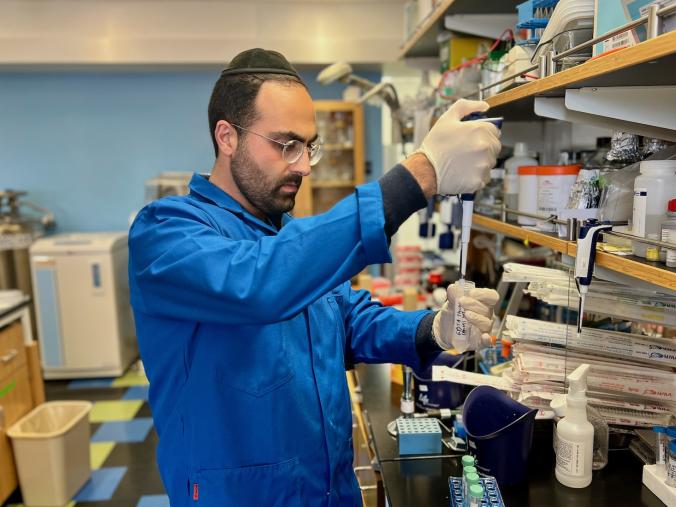Dental Dynamo: Daniel Mishail, D.D.S. '24

This summer’s Dental Dynamos series showcases students who are making the most of their D.D.S. experience! Representing the classes of 2024, 2025, and 2026, these Bruins are not only excelling in their formal training but are pursuing opportunities beyond Westwood to help position themselves as successful practitioners.
Up next is Daniel Mishail, D.D.S. '24, a native of Los Angeles who completed his B.S. in microbiology, immunology, and molecular genetics from UCLA in 2019. Last academic year, as one of only six Albert Schweitzer Fellowship recipients from LA-area health sciences institutions, Daniel helped establish a program to increase oral healthcare access for previously unhoused individuals. In addition, Daniel has participated in several research projects alongside School of Dentistry faculty members – funded by the American Academy of Implant Dentistry and the National Institutes of Health – and helps train the next generation of dental students as an instructor for Basic Dental Principals.
Without further ado, let’s meet this D4 dynamo!
School of Dentistry: How did you choose UCLA School of Dentistry?
Daniel Mishail: I wanted a high-caliber science education and access to ample research opportunities. UCLA was the natural fit for me.
SOD: What has been your favorite part about dental school?
DM: Learning skills that will help me make a tangible impact on the lives of others is a really empowering experience - my first cleaning, extraction, filling, crown, and denture are all memories that I will never forget!
SOD: Now in your final year, what area of dentistry interests you the most, and what are your post-D.D.S. goals?
DM: I’m interested in the profound impact that periodontal care has on systemic health and I’m looking to eventually pursue post-graduate training in Periodontics.
SOD: What is one piece of advice do you have for both pre-clinic (D1 and D2 students), and those just starting to see patients (D3s)?
DM: For preclinical students, it’s really easy to forget your motivation of why you began school when you have an endless list of exams and projects due. Just remember that the caliber of your preclinical experience has a real effect on how you eventually treat patients. Imagine that one tooth you are focusing on belongs to real person; would you let someone go home with sloppy work done? Your preclinical years are also a very special time to work on your underlying philosophies of what kind of doctor you want to be.
For new clinicians, it’s really easy to home in on the one procedure you are doing and forget that that tooth is connected to a person. Learn to look at the entire person that you are treating. Do they have any other medical issues? How hard was it for them to come see you today? What do they do for a living? Can they communicate well? Social determinants of health play a very large role in your patient’s health outcomes; learn to appreciate how a person’s culture, background, and interests affect how they receive treatment in the clinic.
SOD: What has been your greatest challenge in dental school? How did you overcome it?
DM: Dental school is different than undergrad. You aren’t trying to pass a class. You are trying to become good at preventing disease and promoting health. While you definitely need to pass dental school to become a dentist, you also want to be able to maintain your knowledge and build it throughout your career. Changing my mindset from short-term memorization to long-term knowledge was a major transformation in my first year of dental school.
SOD: Can you give us a high-level overview of the research you were involved with, as well as your findings?
DM: I’m involved in a few research projects. My biggest project is with Dr. David Wong, where I am designing an assay that can potentially inform patients of their susceptibility to dental implant failures. So they spit in a cup, and we can tell them if the implant that they want to get will fail. It’s meant to be a pre-surgical test to reduce incidences of post-surgical complications that implants can present with. I’m also working on another project with Dr. Beatriz Bezerra on understanding the correlation between periodontal stability and distance to the dental clinic - does the distance you travel to see a dentist correlate to your periodontal health? My interest in research is to use the inquiry to directly impact or better understand patients.
SOD: What did you accomplish through your Albert Schweitzer Fellowship?
DM: Access to care is a huge issue in healthcare as a whole, but in dentistry in particular. The Los Angeles Schweitzer Fellowship is an innovative program that allows health professional students to design a project with a community organization that revolves around access to care or social determinants of health. My project revolved around partnering with a tiny home village and helping residents apply for DentiCal, as well as creating a carpooling system between the tiny home village to the UCLA Dental Clinic. The idea is that these patients – who theoretically would have a disparity in their ability to pay for and access care – would have those obstacles removed through the systems that my project would set in place.
--------------------------
Meet two more Dental Dynamos:
Jay Patel, D.D.S. '25
Kay Chung, D.D.S. '26
